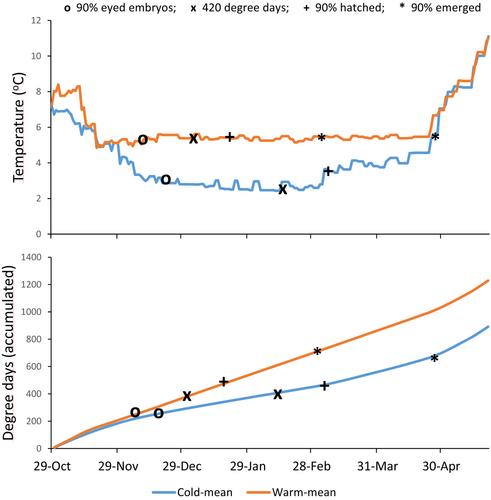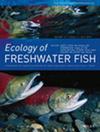Do predator odours and warmer winters affect growth of salmonid embryos?
IF 1.6
3区 农林科学
Q3 FISHERIES
引用次数: 0
Abstract
Conditions early in ontogeny can have considerable effects later on in life. Many salmonids spawn during the autumn, and temperature during subsequent embryogenesis may have far‐reaching effects on life‐history traits, especially when considering ongoing climate change. Even biotic conditions during embryogenesis, such as predation threat, may affect later life stages. Here, we examined how predator odours and increased temperatures affect embryonic growth and development of a fish (brown trout Salmo trutta). We found that embryos had lower body mass and greater yolk volume close to hatching when subjected to predator odours. Trout embryos incubated at temperatures representing natural winter conditions were larger than embryos incubated at higher temperatures, although the latter hatched earlier. Fry sizes at emergence did not differ between treatments, perhaps because of compensatory growth during spring. This study shows that predator presence can have similar effects on embryonic growth of salmonids as warming winters, with possible impact later in ontogeny.

捕食者气味和温暖的冬季是否会影响鲑鱼胚胎的生长?
个体发育早期的条件会对以后的生活产生相当大的影响。许多鲑科鱼类在秋季产卵,随后胚胎形成过程中的温度可能会对生命史特征产生深远影响,特别是考虑到当前的气候变化。即使是胚胎发生期间的生物条件,如捕食威胁,也可能影响以后的生命阶段。在这里,我们研究了捕食者气味和温度升高如何影响鱼类(褐鳟)的胚胎生长和发育。我们发现,在捕食者气味的作用下,胚胎在接近孵化时体重较轻,卵黄体积较大。在代表冬季自然条件的温度下孵化的鳟鱼胚胎比在较高温度下孵化的胚胎大,尽管后者孵化得更早。鱼苗出壳时的大小在不同处理之间并无差异,这可能是因为鱼苗在春季进行了补偿性生长。这项研究表明,捕食者的存在会对鲑科鱼类的胚胎生长产生与冬季变暖类似的影响,并可能在发育后期产生影响。
本文章由计算机程序翻译,如有差异,请以英文原文为准。
求助全文
约1分钟内获得全文
求助全文
来源期刊

Ecology of Freshwater Fish
农林科学-海洋与淡水生物学
CiteScore
4.10
自引率
0.00%
发文量
45
审稿时长
12-24 weeks
期刊介绍:
Ecology of Freshwater Fish publishes original contributions on all aspects of fish ecology in freshwater environments, including lakes, reservoirs, rivers, and streams. Manuscripts involving ecologically-oriented studies of behavior, conservation, development, genetics, life history, physiology, and host-parasite interactions are welcomed. Studies involving population ecology and community ecology are also of interest, as are evolutionary approaches including studies of population biology, evolutionary ecology, behavioral ecology, and historical ecology. Papers addressing the life stages of anadromous and catadromous species in estuaries and inshore coastal zones are considered if they contribute to the general understanding of freshwater fish ecology. Theoretical and modeling studies are suitable if they generate testable hypotheses, as are those with implications for fisheries. Manuscripts presenting analyses of published data are considered if they produce novel conclusions or syntheses. The journal publishes articles, fresh perspectives, and reviews and, occasionally, the proceedings of conferences and symposia.
 求助内容:
求助内容: 应助结果提醒方式:
应助结果提醒方式:


